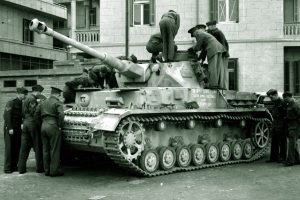
 Armin Bottger was a radio operator in the German Army during the Second World fighting in Panzer IV tanks. He served as a private in the 12th Squadron, 24th Panzer Regiment that was part of the 24th Panzer Division that saw action in France, Italy and Eastern Front from 1943 until the summer of 1944. His memoir covers his service in the Reich Labour Corps in 1940, his training in the Wehrmacht and accounts of active service in various engagements fighting the Russians in southern Ukraine, the Nikopol bridgehead and Jassy until he was wounded in August 1944. After medical treatment, he was graded for home service only and became a courier. He surrendered to American forces in May 1945.
Armin Bottger was a radio operator in the German Army during the Second World fighting in Panzer IV tanks. He served as a private in the 12th Squadron, 24th Panzer Regiment that was part of the 24th Panzer Division that saw action in France, Italy and Eastern Front from 1943 until the summer of 1944. His memoir covers his service in the Reich Labour Corps in 1940, his training in the Wehrmacht and accounts of active service in various engagements fighting the Russians in southern Ukraine, the Nikopol bridgehead and Jassy until he was wounded in August 1944. After medical treatment, he was graded for home service only and became a courier. He surrendered to American forces in May 1945.

The account is wide-ranging and covers some interesting aspects. He talks about his colleague Unteroffizier Heynco Graf Posadowsky-Wehner who ‘had a Jewish grandmother and was therefore of “impure race”’ However, he goes on ‘so far as 12.Squadron was concerned this was irrelevant.’[1]
He also talked about his association with his squadron and regiment. The 24th Panzer Regiment was regarded as an elite unit and was formerly a cavalry unit. It was wiped out at Stalingrad but reconstituted in 1943. The unit ‘continue[d] to wear the gold piping on the cap, collar and shoulder straps’ whereas ‘all other German panzer men had pink piping’. The unit also used calvary terminology for unit designations such as calling his company a squadron.[2] He also noted by that by August 1943 that ‘the soldiers of 12.Squadron were by now well acquainted with each other and 12.Squadron was “our” squadron and the longer the war and stresses went on, the more we were proud to be a member of a well led and operated panzer unit. This self-identification with 24th Panzer Regiment and 24th Panzer Division was very marked. The division was inseparably associated with the cavalry tradition…It had been a sort of “homeland” during the battles at the front. Nobody wanted to belong anywhere else even though the 24th was a “fire brigade” sent to dangerous hotspots of each battle.’[3]

One of the interesting dimensions of this report was his perspective on the debate about the role of the Wehrmacht in the atrocities committed as part of the Holocaust on the Eastern Front. He was highly critical of the view put forward by some German politicians that ‘stated that even the simple German soldier was not free of “war guilt”’.[4] Though he conceded that ‘today nobody can doubt that even the Wehrmacht was entangled in criminal orders and was guilty of war crimes’ the simple soldier was under ‘a compulsion to follow orders before which one had no option but to bend’. He also said that those who focus on atrocities ‘omit from their portrayal and evaluation is the enormous influence of an environment changed by war, life in uniform, in a group, the soldier’s obligation to duty and obey, his anxieties and the polyphony of suffering’.[5]
He also added that there was very little he could have done about stopping any atrocities had he known about. He explained that ‘some time ago a young American asked if I knew anything about the Holocaust as a soldier…In response to my “No”, he asked somewhat dubiously what I would have done if I had known. I replied “Nothing”. There was not the least thing I could have done, and not only because the ordinary soldier lacked the means but also because my comrades and I had enough to worry about in our own situation in order to survive…’[6]
In conclusion, this is an interesting account. The thing that marks it out from other memoirs are two things. Firstly, Bottger reflections on the recent controversy over the atrocities committed by the Wehrmacht. Secondly, his plea that when judging the ordinary soldier on the front (like Bottger) in relation to these incidents, consider their perspective by walking in their boots and think about what realistic options they had to avoid, mitigate or prevent these incidents from happening.
Notes:
[1] Armin Bottger, To the Gate of Hell (London: Frontline, 2012), p.26.
[2] Ibid., p.21.
[3] Ibid., pp.34-35.
[4] Ibid., pp.108-109.
[5] Ibid., p.112.
[6] Ibid., p.73.

